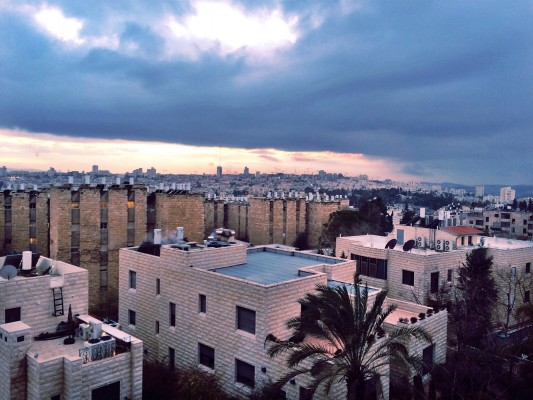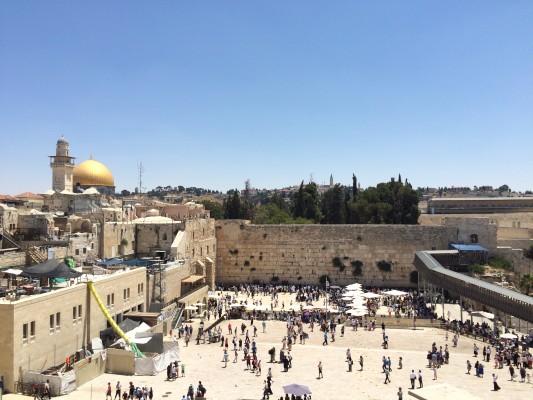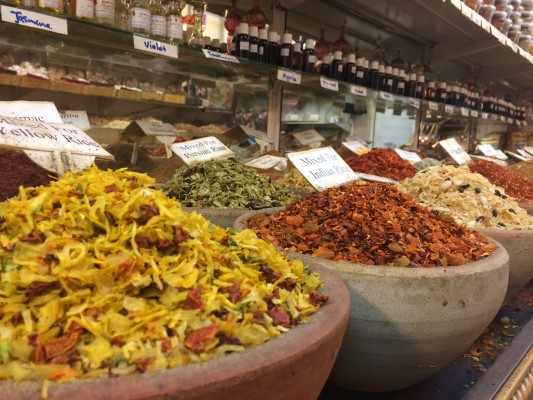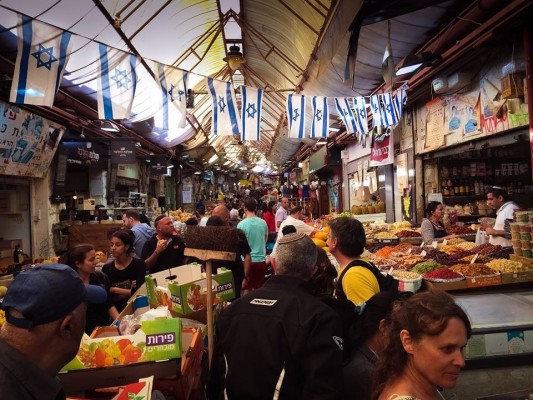Life in Jerusalem, the Unaccounted Narrative
February 24, 2016
Every morning at 8:10 a.m. I leave the student village and embark on my 15 minute journey to Hebrew University. The uphill walk offers a view of the distant golden top and perhaps the most contested landmark in history. Once the Dome of the Rock gets lost in my view and I begin to pant a little more heavily, I walk quickly past two bus stops. Sometimes there are guards, sometimes not. Just a few more steps until I have to show my Hebrew University I.D. card, leave my bag and phone on the table and walk through a metal detector. After looking through my bag, the security guard zips it up and hands it to me, smiling, and says “yom tov,” meaning “have a nice day.” Now I have officially entered campus and can continue to class.

Before leaving for Jerusalem, I had received all kinds of reactions after telling people where I was studying abroad. Some didn’t say much while others relentlessly interrogated me. Over winter break I was sitting at a dinner party in a room full of white collar adults who were asking me why I’d chosen to live in a war zone, asking if I’d have to veil, what it was like living in an apartheid state and making some pretty offensive remarks that I’ll refrain from repeating. It does get annoying when I see how ignorant some are about Israel but can I really blame them when the only exposure they get is a picture of angry Benjamin Netanyahu banging his fist on the table while talking about increasing retaliation towards anti-Israeli attacks?
As you may recall, back in October there were several reports of terrorist attacks carried out by Palestinian radicals against Israeli civilians. These waves of attacks have not stopped. Almost every day since arriving, I’ve read about another attack in Jerusalem. Just as I was writing this article, I got a notification that a 19-year-old border policewoman was killed in a stabbing and shooting attack at Damascus Gate in Jerusalem’s Old City. Why is it that almost every day for the past four and a half months there has been some kind of attack, and why is it that the media outside of Israel has stopped covering it? Over 30 Israelis have been killed and a little over 300 wounded. These attacks take place in the form of throwing rocks, stabbings, intentional vehicle crashes and shootings. Which begs the question: could this period be a Third Intifada? The First Intifada, or wave of mass terrorism, was from December 1987 — 1993 and the second took place in late September of 2000, ending around 2005.
So yes, there is reason for people to bring up such concerns upon hearing that I will be living in Jerusalem for the next five months or so. I’d be lying if I said living here is an easy transition. Jerusalem sits on the edge of the West Bank. Hebrew University is surrounded by Arab neighborhoods, this being the reason we are advised not to walk alone. There are certain things you have to get used to when living in Israel. It was pretty clear from the mandatory one-hour security orientation in which we were told where to go, where not to go, how to safely take the bus, not to cross the green line, not to enter certain countries, et cetera.

There is an underlying tension here. I pick up my pace when walking past train stops. I try to not get too close to people, avoid large crowds and am generally more on edge when out in public. But part of this paranoia simply stems from being a foreigner in a new place. For Israelis this is all just a part of life, just as seeing armed soldiers sit in a street cafe with their assault rifles casually slung around their shoulders while having a cigarette is a normal scene. Every now and then you’ll see a security guard escort someone off a train and proceed to search them. You may even get evacuated off a train due to a suspicious package found so the police can investigate, and in extreme cases blow it up on the spot. At this point, you may be thinking this is no way to live. But these are not the things that come to mind when I think of Israel. It’s not all politics, war and hiding in bomb shelters.
Israelis are loud, blunt, in your face and don’t quite understand the concept of waiting in lines. They use their hands when talking out of pure enthusiasm. They’ll invite you over for Shabbat dinner, a Friday night tradition spent with family and friends, after only meeting you once. A walk through the shuk, or market, a sensory overload from the smell of freshly baked challah, an old man yelling in your face to taste his dried fruits or the spice guy across the hall trying to lure you into his shop, all while trying to avoid the stray cats.

And let me tell you, they know a thing or two about good food. The hummus here is truly a godsend. There are no preservatives in the food, so bread gets rock hard after one day. The vegetables are so fresh I can’t even eat some of them raw, because I’m not used to the strong taste. Everything is fresh, vibrant and topped with a variety of vague yet delicious sauces.
Beyond the fun-loving and friendly atmosphere is the incredible sense of nationalism. People know this country has its flaws, yet have no intentions of leaving. The mandatory draft for both men and women is a great example of the strong sense of patriotism. Additionally, the Israel Defense Forces (IDF) has had over 6,000 Lone Soldiers, or people with no immediate family in Israel, who have come out of their own will to serve in the army. What other country has foreigners coming to join the army? Almost every Israeli can tell you that they grew up with their mothers and grandmothers telling them maybe one day they would not have to go to the army because there would be peace.
Don’t get me wrong, Israel has its issues. You can’t blindly love a country and the people here all have an opinion about the conflict. It is sad that everyday people on both sides of this fight are suffering. But that is not the only story. Israel is a beautiful country. Just thinking about the people, the landscape, the culture and the history warms my heart. There is so much more than what we see and read about—or don’t read about—in the news. Despite it all, Israel lives and thrives in the most incredible way.
[envira-gallery id=”28169″]










